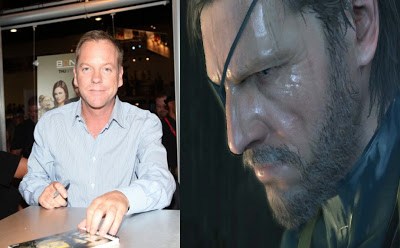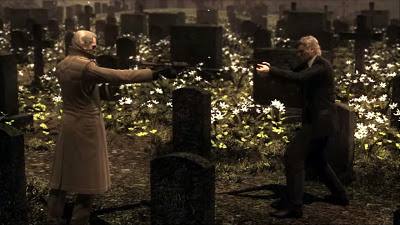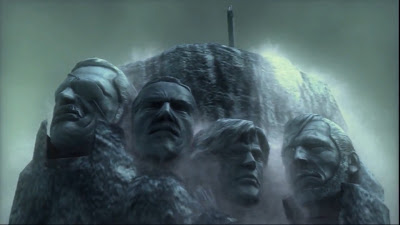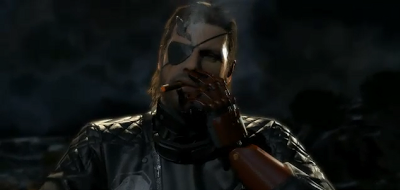This post has not been edited by the GamesBeat staff. Opinions by GamesBeat community writers do not necessarily reflect those of the staff.
During Konami’s pre-e3 stream, it was revealed that Big Boss would indeed have a new voice actor with Kiefer Sutherland replacing David Hayter as the voice of the iconic hero of the Metal Gear Solid series and fans have been up in arms. Die-hard Hayter fans took to Twitter and various message boards in protest: How could Kojima Productions replace Snake’s signature grumbly voice after over 15 years of devotion to the series? How could Hideo Kojima forsake the man that sacrificed a portion of his paycheck to ensure that the original voice cast could be hired once again for the remake to Metal Gear Solid. Kojima stated that Kiefer Sutherland was chosen to give Big Boss a more subdued demeanor in order to compliment Metal Gear Solid V’s much more darker themes such as race and revenge. Revealing a top notch actor along with a valid reason for the replacement still hasn’t calmed the masses raving on the internet who have even threatened to boycott the game if Hayter is not cast. As much as Hayter deserves this love from fans and a role in the latest MGS installment, the decision to recast Big Boss is an absolute necessity not only for the character to grow but for the series to expand further into unexplored territory.
This article isn’t meant to compare either actor’s performing abilities: both men are amazing actors in their own right. This article is meant to provide an argument why the voice of Big Boss must change in order for the entire series to progress.
The main reason why Big Boss should not be voiced by David Hayter is because of the fact that Big Boss is no longer a Snake. Hayter is credited for voicing two characters in the entire series; Solid Snake and Naked Snake (aka Big Boss). He voiced Solid Snake in MGS 1, 2 and 4 and Big Boss in 3, Portable Ops and Peace Walker. Like father like son, these two Snakes share very similar characteristics and very similar character arcs throughout their lives.
During the events of MGS1, Solid Snake accepted a mission that proved to be more than what it seemed to be. The U.S. army black ops group turned rogue, Foxhound, took control of Shadow Moses Island and made a threat to launch a nuke if their demands were not met. It turned out that this group of terrorists consisted of disciples of the legendary soldier, Big Boss, and was led by none other than Solid Snake’s biological brother, Liquid Snake, who wished to carry out a plan bigger than the United States government itself. Snake realized that the motives of a higher power was bigger than even himself. This is mirrored in his father’s epiphany during the events of MGS3 where a mission of Soviet espionage turned into a tale of betrayal that made him questioned his allegiance to his own country.
Another parallel between the two is that they were both betrayed and used by their own mentors which led to both establishing their own view of the world and their own ethics. Big Boss was betrayed by his mentor, The Boss, and was forced to end her life. This drove him on the war-torn path that would ultimately create the world and lore of Metal Gear. Solid Snake, during the events of Metal Gear (NES/MSX), would be led by his commander Big Boss throughout his entire mission in Outer Heaven. It would be revealed that Big Boss was actually the leader of Outer Heaven and intentionally led Solid Snake into traps and gave him false intel. In the end, Solid Snake would end the life of his mentor and father whose philosophies of the world could not co-exist with his own.
With such similarities, it is no doubt why both men shared the iconic voice for 15 years. Both men have been portrayed as the persevering warrior that would only wage war for the good of the world, however, Big Boss’s path leads to a much more tragic end than that of his son’s. Solid Snake would live to be the hero that would free the world of the Patriot’s grasp while Big Boss would live to become the evil war monger who used child soldiers and an entire war state to bring the world to the brink of Apocalypse. With Kojima’s need to give the series more darker themes and with the franchise’s chronology creeping closer to Big Boss’s own climax, the need to bring a new voice actor to emphasize this tragic shift becomes tragically apparent.
The trailer for Metal Gear Solid V, which takes place in 1984 (11 years before the events of Metal Gear) foreshadows Big Boss’s downfall in the last few moments where he rides off on a black motorcycle, wearing a black leather jacket, with a black piece of shrapnel embedded in the right side of his skull. The piece of shrapnel is symbolic of a demon’s horn sprouting through his head yet only on the right side. This may mean that he is slowly traveling down the evil path that he will end up during the events of Metal Gear. With MGSV being the start of a new chapter in the series and for Big Boss, it would be inappropriate for David Hayter to voice a man who will commit such heinous acts of war and death. Hayter’s voice is reserved for the hero who puts the needs of his comrades and the world first before anything. He is only reserved to voice a Snake.
There have been four characters that bear the name Snake throughout the game series; Naked Snake aka Big Boss, his perfect clone, Solidus Snake, and his twin sons, Solid Snake and Liquid Snake. Liquid Snake and Solidus Snake have different voice actors; Cam Clarke and John Cygan respectively. Both the main villains of their respective games, neither is referred to as Snake. Liquid Snake is simply referred to as Liquid and Solidus Snake (after being mistaken for Solid Snake) was referred to as either George, The President, or King. The only characters repeatedly referred to as Snake are Solid Snake and Big Boss who are both voiced by David Hayter.
At the end of MGS3, after Big Boss proved his loyalty to the mission and his country by killing The Boss, he was awarded by President Johnson the title of Big Boss. However, during the events of Portable Ops (6 years after MGS3) he refused the title, preferring his old codename, Snake. This whole time he refused the call to carry on the torch of The Boss, the woman he most respected, believing he was tricked into killing her. During the events of Peace Walker (4 years later), his respect and devotion for The Boss would be put to the test when he is forced to face a Metal Gear like machine that contained an A.I. designed to resemble the mind of The Boss. After preventing a nuclear launch and killing his mentor for a second time, Big Boss would toss away the head band that he took from The Boss in MGS3; a head band that not only represented The Boss but a signature piece of attire closely associated with Solid Snake as well. He would then announce to his devoted soldiers at Mother Base of his plans to create Outer Heaven, the same soldier-controlled state that would nearly bring the world to an end. Finally, 10 years after being awarded the title, Snake would abandon his codename and accept the title of Big Boss and, incidentally, the fate of becoming a monster. “Monster” was what his former comrade and close friend during Peace Walker, Kazuhira Miller, would call Big Boss when he would speak to his son, Solid Snake, almost 20 years later.
A monster is certainly not someone that Hideo Kojima wants to be associated with David Hayter’s Snake, a character loved by many gamers with the most distinct voice in all of gaming. He instead opted to give Big Boss a more subdued and serious actor like Kiefer Sutherland to guide the character on his dark new journey. People might still complain about the voice change but it’s evident that Kojima planned everything with pure intentions and with great respect and love to the fans of his series and to David Hayter who had just as much responsibility in bringing to life such a powerful character. Let us not bicker over the artist’s direction but allow him to take us for another wild, cinematic and emotional ride.





